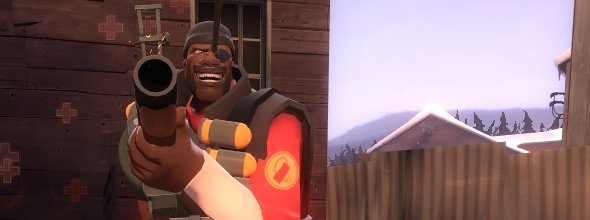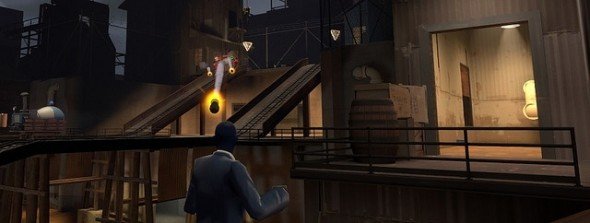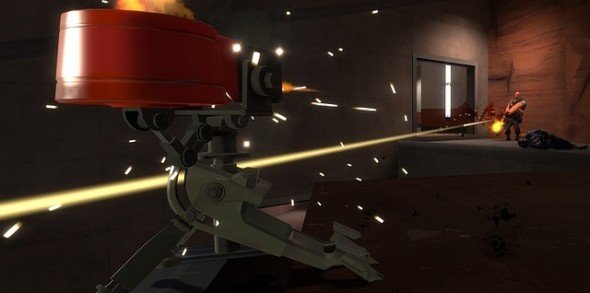Valve on the future of Team Fortress 2. Part Two

Team Fortress 2 has updated all nine of its classes now, so everyone's curious about the future of the game. I posted myself to Mann. Co headquarters in the hope of wrestling Saxton Hale for answers, but when I arrived I found only project lead Robin Walker, in his throne room at Valve. Disappointed, I clambered out of my box and interviewed him nevertheless.
He talked about where TF2 can go from here, how many people are still working on it, what they plan to include in the next update, why unlocks work the way they do, why they might start a new TF2 beta, and what the point of hats is. Accordingly, the interview is long. This is part two, part one is here .

PC Gamer: What's the point of hats?
Robin Walker: Customers being able to make themselves stand out in any way has value. Status has value to people. Our experience in watching multiplayer environments has been a couple of things that players really value is the ability to display their status and display their affiliation. So some of it is about players being able to show status. We don't really have a good solution for affiliation yet. You and I can't show that we're buddies in a super way. We have a little bit of it: the Sam and Max hats are an affiliation thing, right? It's saying I'm a fan of this other external thing, and that has value. The employee badges are direct status shows, they were designed to be, like, how do I prove I'm a bigger TF2 fan than you are? Well, I bought it earlier.
There are all these things that customers care about a whole bunch and part of the fact they care about them is because they're rare. That's just human nature, and that's been well shown. From a customer perspective that's why it's there, and that's part of the reason why we did it.
The other reason why we did it is something that's just entirely about us as a company, which is that we wanted to build systems on the back end to support these kind of things. We wanted to go through all of the support nightmares of working through all these sorts of things, and we wanted to build experience in how to design and build them, because we think those things are important in future products.
PC Gamer: It seems like TF2 is a flagship for what Gabe is often talking about, in terms of the integrated experience of being a fan. So you play the game, watch the Meet The Team videos, read the comics online, and it all comes from Valve and is all the same level of quality. What do you think is the benefit of that, and how does it manifest itself? In other words, how do you know it's working?
The biggest gaming news, reviews and hardware deals
Keep up to date with the most important stories and the best deals, as picked by the PC Gamer team.
Robin Walker: Some of that we can measure. We can measure the amount of traffic we generate around specific PR events. Some of it's a philosophical belief we've had as a company from day one, I think, and that is a belief in customer happiness.
We think it should be really fun to be a customer of Valve. That has a lot higher value than people would think it does, and we believed this long before we had something like Steam. We believed this back when we did Team Fortress Classic for free, when we had no way of making money out of that. It wasn't like you could say “I love Team Fortress Classic, I like what Valve did for me there, I'm going to go buy some other product on Steam.”
Now, Steam has made that a little easier for us, in that now you can go and say “I really liked the free Alien Swarm, now I'm going to go buy something else on Steam.” I suppose cynics could argue that Alien Swarm was about us indirectly making money on Steam, but we don't think of it that way. To us, the incremental money we can make off lots of things is worth way less than a bunch of people really, really liking being our customers, and that has way more long term value to us than anything else.
I think as companies become bigger, that becomes harder. The problem of being a company that people like becomes harder and harder the bigger you get, and so it's something we need to be vigilant about. And I think caring about our customers is really the thing that's going to make or break us at the end of the day.
PC Gamer: Is the value of that just having them buy your future products, or is there more than that?
Robin Walker: Yeah. The internet's incredibly connected at this point. Years and years ago people were saying “word of mouth is more important than anything else”, but to us it seemed kind of obvious then, and it's even more obvious now. People trust each others' opinion way more than anything else. Gabe has this belief that as an entertainment company, we should be entertaining to interact with in all ways. If you send us an email that should be entertaining. If you get our business cards, that should be entertaining. If you read our blog posts on TeamFortress.com , they should be entertaining. Even our press releases should be entertaining. Because entertainment is what we produce, and we should strive to achieve that in every way.
I think he's right about that. I think that's a reflection of this overall belief that the important thing for us as a company is for people to like us and like our work, and that has much greater value than whether we can get you to pay two dollars more for an item like Alien Swarm or something.
PC Gamer: Does that mean you're going to have to wear clown suits at GamesCom?
Robin Walker: Yeah, Gabe can try to get us to be a little bit more entertaining than we are, but we're not actors.
PC Gamer: Are there other media you'd like to expand TF2 into that you haven't done yet?
Robin Walker: Yeah, I'd love it if TF2 was in everything, but we have a finite amount of time and resources. I don't really have a good answer, I guess. We're not thinking about it right now on the TF team.

PC Gamer: How has the team size varied since launch?
Robin Walker: It drifts down as other projects steal people from us, I think that's the best way to summarise it. I think we're about ten or twelve people right now, and that's been pretty stable for [a while].
We use Team Fortress 2 as a product for a lot of people in the company to move through, because it's shipping all the time, and gets great feedback from its fans. If you've got someone coming from the film industry who's really not used to this idea of, "You need to listen really carefully to your customers and pay attention to what they're saying and think about that when you work on something," then TF2's a really good product to do that on. Because it's live already, they don't work for two years and then get that feedback. They can do an animation and then get the feedback on it straight away.
PC Gamer: How will you know when it's time to wind it down?
Robin Walker: I don't know, we're not waiting for a signal or anything. We try to be rational in all of our decisions about: what are we learning from this? What value are we providing for customers? And if all the customers stopped caring about what we're doing, that would probably make us say "Well, time to move on." To us it wouldn't be about, are we making enough money? The much more interesting question is, what are we learning? How are we growing as a company, and are we growing long term relationships with our customers that'll be useful to us in years to come?
PC Gamer: When you play now, is there any one thing that still frustrates you about the game?
Robin Walker: I see a lot of little bugs I want to fix, but in terms of big frustrations I can't think of too many. It's really hard in a project that's continuously going and shipping regularly, to get too far off the rails in terms of trying to do something that's significantly outside the scope of the resources you've got.
So the first question you ask yourself each step of the way is, "I only have ten people, these are the resources we have, so what are we going to do?" And you're already scoping yourself by those resources. There's not too many things that we've attempted that we've fallen down on - because we didn't try to attempt them in the first place, to a large extent. There are features perhaps I could think of that it'd be nice to have, but that's about it I guess.

